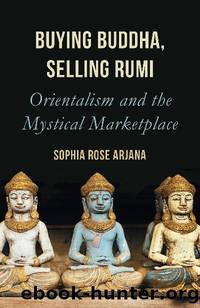Buying Buddha, Selling Rumi: Orientalism and the Mystical Marketplace by Sophia Rose Arjana

Author:Sophia Rose Arjana [Arjana, Sophia Rose]
Language: eng
Format: epub
Publisher: Oneworld Publications
Published: 2020-08-04T00:00:00+00:00
Mystical Tourism
North Americans and Europeans participate in colonialism in numerous ways. One way is through experiencing or purchasing the cultural capital of other religious communities. In a sense, this functions as a type of tourism where one can visit a culture, experience a religious tradition, or engage in a momentary practice. I can read Rumi, wear an Indian tunic, sit in a coffee bar with Orientalist décor while drinking a soy latte after a yoga classâa kind of transitory experience that crosses many cultures. This has great appeal. As scholars have pointed out: âParticularly for members of dominant racial groups who have felt a lack of ethnic community, identity, or pride, the global New Age movement and marketplace can provide an alternative type of symbolic, holistic (but nonspecific) ethnicity that also certainly marks a position of privilege relative to those who cannot âchooseâ their ethnic ascription so easily.â134
In the case of mystical tourism, performance is involved with issues surrounding tourist relations with the host culture. As John Frow notes: âIt is tourism that destroys (in the very process by which it constructs) the authenticity of the tourist object; and every tourist thus at some level denies belonging to the class of tourists.â135 Mystical tourists do this through claims that they arenât tourists but students or participants in a spiritual practice. This is a distancing move, as Frow explains: âHence a certain fantasized disassociation from the others, from the rituals of tourism, is built into almost every discourse and almost every practice of tourism.â136 The very act of denial is colonialismâby creating the illusion that one is not a tourist consumer, the mystical tourist denies all of the colonial attributes of the industryâthe gaze, the inequitable relationships, and the stealing of culture, which is often renamed, repackaged, and distributed for the consumer.
The white individual often claims they know more about the practice or ritual than the indigenous person whose life and community are rooted in these very traditions. This claim of expertise, including white âhealersâ who insist they know more about Lakota ceremonies, is a widespread problem Native scholars and activists call âwhite shamanismâ and âplastic medicine men.â137 Plastic medicine men (and women) who claim expertise in the secrets of Oriental wisdom exist as well, and as we shall see in the following chapters, the claim of expertise is part of a clever marketing strategy that has widespread success.
The clients who purchase a mystical tour of India, Bali, or Morocco are, in a sense, âbuyingâ a culture as a form of entertainment. As discussed in the first chapter, tourism often entails a kind of voyeuristic enjoyment of the Otherâincluding the mystic whose spirituality is dependent in some ways on poverty. Migrants that live in mystical locations like Bali often practice colonialism in profound ways that move beyond a symbolic assumption of Hinduism, Buddhism, or Sufism. European and North American female migrants to Bali often adopt a lifestyle that mirrors the colonial adventures of earlier eras. These include an escape from labor
Download
This site does not store any files on its server. We only index and link to content provided by other sites. Please contact the content providers to delete copyright contents if any and email us, we'll remove relevant links or contents immediately.
The History of Jihad: From Muhammad to ISIS by Spencer Robert(2618)
Nine Parts of Desire by Geraldine Brooks(2355)
The Turkish Psychedelic Explosion by Daniel Spicer(2352)
The First Muslim The Story of Muhammad by Lesley Hazleton(2263)
The Essential Rumi by Coleman Barks(2042)
1453 by Roger Crowley(2022)
The Last Mughal by William Dalrymple(1854)
Trickster Travels: A Sixteenth-Century Muslim Between Worlds by Davis Natalie Zemon(1839)
Muhammad: His Life Based on the Earliest Sources by Martin Lings(1644)
God by Aslan Reza(1639)
by Christianity & Islam(1627)
A Concise History of Sunnis and Shi'is by John McHugo(1563)
No God But God by Reza Aslan(1536)
Magic and Divination in Early Islam by Emilie Savage-Smith;(1533)
The Flight of the Intellectuals by Berman Paul(1501)
Nothing to Envy by Barbara Demick(1444)
Art of Betrayal by Gordon Corera(1428)
What the Qur'an Meant by Garry Wills(1390)
Getting Jesus Right: How Muslims Get Jesus and Islam Wrong by James A Beverley & Craig A Evans(1334)
